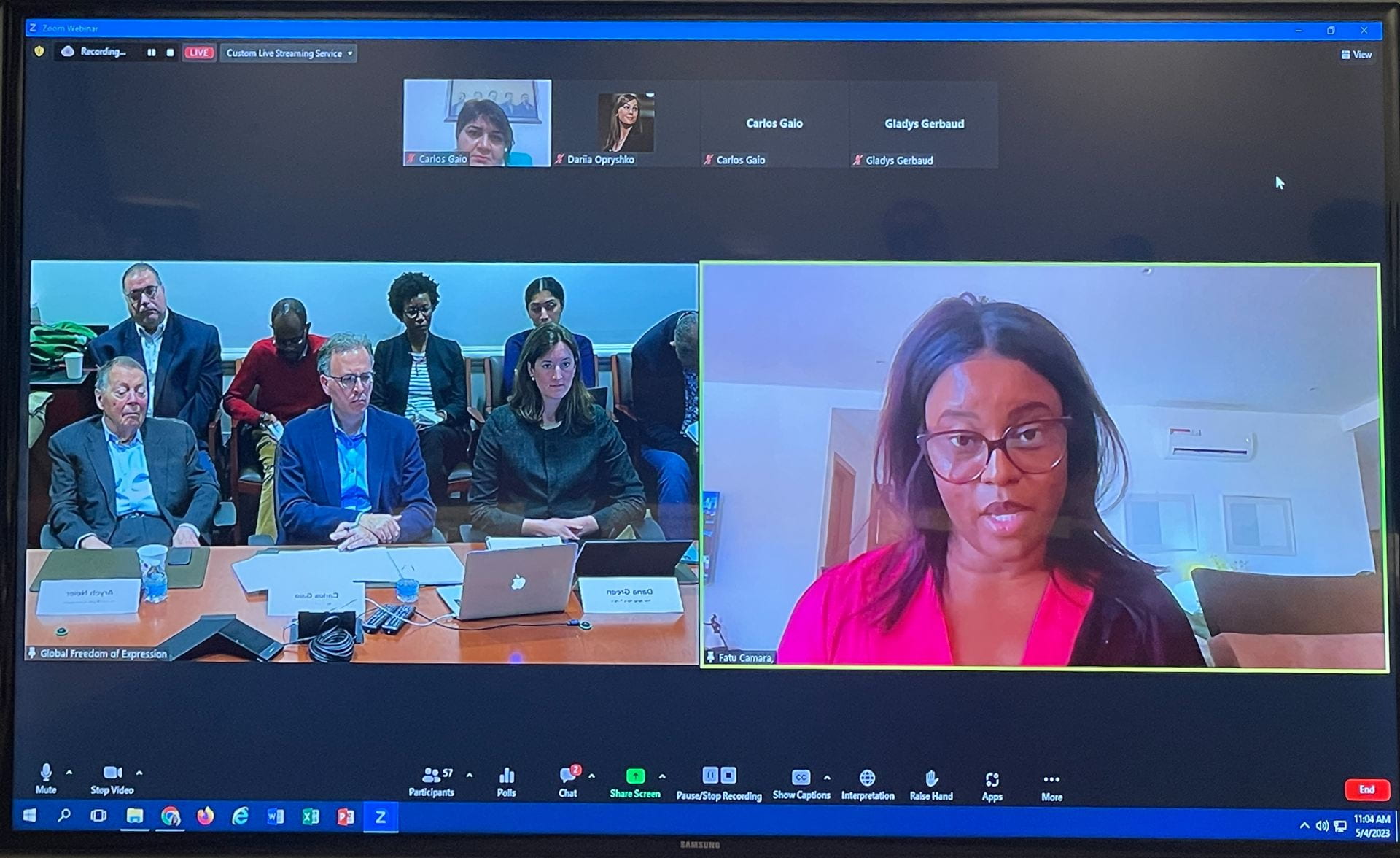Virtual attacks by politicians and online trolls threaten freedom of expression worldwide.

Fatu Camara (right) discusses the persecution she faces from politicians and online trolls as an independent journalist in The Gambia during a WPFD event.
NEW YORK — The Azerbaijani government tried to blackmail investigative journalist Khadija Ismayilova by placing a camera in her bedroom, creating “intimate life videos” to get her to stop publishing critical stories, she said. “Then when I didn’t agree to step back, the video was published.”
“Something like that was done to me, too,” said Gambian journalist Fatu Camara. “They took a video from a porn site and put my face on it and said that that was me and shared it all over the country.”
Their experiences are not unusual. Two in three women in media report online harassment, according to a report by the International Women’s Media Foundation. At a World Press Freedom Day discussion on Columbia University’s campus, two of the three female journalists present mentioned facing gendered online attacks from either their governments, politicians or online trolls.
Dana Green, senior legal counsel at the New York Times, said in an interview after the event that threats against women and other people who hold minority identities — their sexuality, race or religion, for instance — have two main impacts on the profession. First, attacks like the ones described by Ismayilova and Camara push people out of journalism.
“I think we — the news industry in general, not just The Times — have been very cognizant in recent years that who tells the news,” Green said, pausing, “it matters.” That is why newsrooms have focused on building more inclusive, diverse workspaces, especially through recruiting people from across racial and economic backgrounds. “If every single day, you are being subjected to threats against your life, threats against your family — that has an impact on retention of talent in the field.”
“In The Gambia,” Camara said, “we do not get killed. Journalists are not being killed, we’re not being beaten. But still, there are a lot of verbal assaults against journalists, especially if you’re a woman, a journalist and you’re not married. That is always a problem because what they use to shut you down is that you sleep with everyone. So when you live in a country like The Gambia — 95% Muslim — that gets a lot of people to be quiet.”
Second, Green said, harassment, intimidation and attacks like this make the news cost more to cover. “The Times robustly invests in a security team, in psychological support, in practical support for our journalists,” she said, mentioning she was not speaking in an official capacity for the Times. “That has a cost. Like all costs, every cost you add to telling the news makes it harder for local news, for independent media, for non-profit media to operate.”
Not only are women facing online harassment, they are also dealing with a larger problem facing journalists generally. Local media is essential for holding authority accountable around the world. But in places where journalists are under attack, that task becomes much harder.
For instance, in Azerbaijan, where Ismayilova said in-home video surveillance of her was released to intimidate her, media outlets are now required to register and apply for a license to operate. Additionally, the law requires founders of, or majority shareholders in, companies to reside in the country, which limits foreign funding that Ismayilova says is necessary for independent reporting.
“We have a huge number of the websites and media organizations which are praising the president,” Ismayilova said. People who do critique the government face online hacking episodes and court-sanctioned website blocking. “People are under digital surveillance all the time,” she said. “We have problems with speaking to our sources of information because they are being exposed by digital surveillance.”
“You can’t report the news if you can’t communicate with sources and if you can’t do so candidly,” Green said. “In the U.S. we have really robust protections against being compelled to disclose your source. And also robust protections against law enforcement using indirect methods to identify your sources.” Both of those intimidation strategies — especially the latter — are being used in countries around the world to inhibit the work that journalists are doing.
For Green, the experiences that face journalists, especially women journalists, around the world are deeply connected to the state of journalism in the U.S., too. Green said the legal protections we rely on in the U.S. could be changing with upcoming Supreme Court decisions in Gonzalez v. Google LLC and Twitter, Inc. v. Taamneh. “Freedom of expression doesn’t happen in a vacuum,” she said.
Although the work can be overwhelming, Green said, she chose to focus her career on freedom of expression because she believes it is the foundation of other human rights. “Without the ability to debate and freely discuss issues, you can’t take action on them,” she said. “Whatever issue you care about and whichever side of it you’re on, your ability to engage with that issue and to advance your perspective depends upon your ability to communicate.”


anadrol capsules
References:
virnal.com
As you will find, though, nearly all anabolic steroid customers will stick to injecting their gear via the muscle whereas leaving subcutaneous injections for these extra compounds which are typically used.
The lack of PCT requirement for females is one benefit ladies have over males when it
comes to steroid use. Each cycle is proscribed to 4-6
weeks and consists of just one steroid compound per cycle.
Feminine steroid customers will largely be limited to only sure Steroid Program for Mass Gain compounds,
will use them at much lower doses, and can restrict the size of cycles to reduce the event of virilizing effects.
Don’t fear – the Feminine Bulking Stack won’t have you ever turning into a person.
This combination of testosterone and Deca Durabolin is the least toxic bulking
stack in our experience. Intermediate users generally administer this
stack once their physique comfortably tolerates testosterone-only cycles.
Superior steroid users can devour dosages that exceed one hundred mg per day; however,
this typically causes excessive levels of toxicity. Anadrol’s
advantages largely mimic Dianabol’s, producing significant
will increase in muscle hypertrophy and power. Anadrol
(oxymetholone) is thought to be one of the potent bulking steroids, generating barely extra weight accumulation than Dianabol in our expertise.
Anabolic steroids corresponding to stanozolol and boldenone are artificial derivatives of
the male hormone, testosterone. They are labeled for utilization with debilitated or weakened animals, and
are prescribed to stimulate appetite, enhance weight gain, strength, and vigor.
Anabolic steroids are used in equine medication for constructing weight and
muscle mass, and to alleviate anemia. In the race horse trade, many contemplate
the use of anabolic steroids as a method to enhance velocity and win more races.
For novice users, they should take well-tolerated and
delicate anabolic steroids to avoid possible steroid unwanted effects.
They additionally should perform short week
cycles of around 6 to 8 weeks as a end result of longer cycles will have an effect on their health.
Other male-specific unwanted effects of steroids include the event of breast
tissue (gynecomastia) as a outcome of elevated estrogen levels.
Most different AAS usually are not a substrate for aromatase or are converted at decrease rates,
although the latter group can still yield a considerable amount
of estrogen if administered in excessive doses. The produced estrogen subsequently exerts its results by binding to estrogen receptors α and β, thereby diversifying the
organic effects of the parent compound. Estrogen production is very related in gentle of the event of gynecomastia
and the adverse endocrine feedback exerted on the hypothalamic–pituitary–gonadal axis (HPGA).
We describe its role herein in further element in the subsections on Gynecomastia and Testosterone Deficiency.
Long-cycle testosterone dosage will vary from 200mg/weekly at the low finish
if you’re looking for HRT only… Up to 800mg or much more at the
prime finish when cruising on a protracted cycle.
If you’re blasting, you’ll look at even larger doses, however I’ll cowl that in the quick cycle section under.
That takes us to Equipoise – this testosterone-derived steroid
is a modified form of Dianabol. EQ has much less estrogenic exercise than Dianabol,
however all testosterone-derived steroids may find yourself
in the development of water retention. Testosterone derivatives are usually
favored extra for bulking cycles quite than chopping cycles where fluid retention is undesirable.
With this frontloading method comes both sooner
outcomes and a extra speedy onset of unwanted effects initially of
the cycle. Suppose you’re significantly sensitive to androgenic and other side effects.
There are three established methods of administering injections from a medical perspective.
Whereas it’s important to know these, we shouldn’t simply assume that we are in a position to use simply any method
for steroids. As you will see, one technique in particular ought to never be used and comes with a seriously excessive threat of demise.
We can’t contemplate Clenbuterol to be a safe drug, and
there are undoubtedly different safer fat-burning
options out there (even a steroid like Anavar is likely to come with
fewer risks for females).
Anabolic steroids are artificial derivatives of testosterone which have both medical applications and a high potential for misuse.
Regardless Of their therapeutic advantages, anabolic steroids are frequently misused
as a outcome of their ability to reinforce muscle
size and strength, which can lead to vital antagonistic results and long-term health risks.
Excessive doses of Testosterone Cypionate will give you spectacular
strength features that may turn out to be distinguished after
three or four weeks.
It simplifies the complicated means of dosage conversion, permitting
for better planning and safer usage. However, do not forget that whereas this device
is helpful, it’s important to strategy steroid use fastidiously, considering
all health dangers concerned. We encourage you to strive this software and enhance your understanding of steroid dosages to optimize your
fitness journey safely. Bodybuilders, athletes, and fitness fanatics looking to optimize their performance and achieve specific objectives can profit from
this calculator. It helps to ensure safe and efficient utilization of steroids
whereas minimizing potential unwanted effects.
Anabolic steroids act similarly to the natural hormone testosterone, which performs a significant role within the progress of muscle tissue and energy.
Those are removed from the one roles of testosterone, however they’re the primary ones that attract bodybuilders
and athletes to anabolic steroid use12. When a large dose of testosterone is run every two weeks, testosterone ranges often spike significantly in the preliminary
days, reaching excessively high ranges. Subsequently, these ranges begin to
decline, reaching optimal ranges around the fifth day and
persisting until they return to baseline by the fourteenth day.
This injection sample usually leads to challenges for sufferers,
including a surge in power, heightened sexuality, and sometimes
nervousness, adopted by a recurrence of testosterone deficiency signs.
Described as a cycle of high peaks followed by low troughs,
this fluctuation contributes to a suboptimal expertise for individuals and gave rise to the popular TRT time period of feeling ‘unstable’.
The Steroid Conversion Calculator is an important software
for anybody concerned on the earth of anabolic steroids, whether or not you are a bodybuilder, athlete, or just looking
for information for research functions.